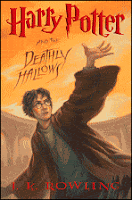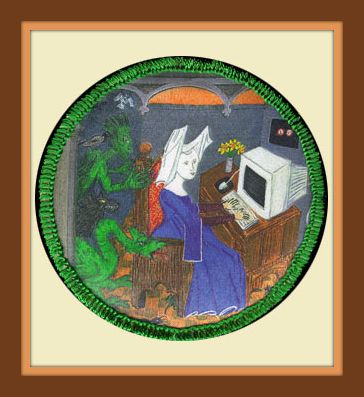
After writing, what? like 5 posts about HP7, I still haven't recorded my overall thoughts on the book. Because it's taken me so long to get here, they will be brief.
The increasing complexity of many central characters--Dumbledore, Snape, the Malfoys, and even Dudley--are also a part of childhood and adolescence gone. Harry learns to see the world not in monolithic black and white, but in many shades in between. Yes, Snape does redeem himself in book 7, but he is certainly a Snape conflicted. He doesn't like Harry, he had strong inclinations to the Dark Arts. R made an interesting comment. Rowley portrays Voldemort in a world without love. Snape is kept from being wholly immersed in this reality by his love for Lily, but it is the only thread. (I love the line to Harry when he dies: "Look--at--me." He wants to see Lily's eyes one last time.) The NYT says that Harry et al's experiences in this book are the
"final initiation into complexities and sadnesses of adulthood".
And, that fourth chapter when Harry and the aurors leave Privett Drive was an explosive way to get that theme going. Hedwig's death there, as much as anything, represents Harry's final bit of childhood getting wrenched away him. The section where the Weasleys and Harry were waiting for the others of the group to apparate at the Burrow was nail biting.
Even leaving the wedding with Ron and Hermione, though, Harry hasn't found his leadership stride. That happens so convincingly when he digs the grave for Dobby and then buries him.
The aimless wandering in the first half of the book with the tent as shelter was so painful to read about, yet to me showed how deeply Harry had no idea what to do or where to go.
When we see Snape's recollection of Dumbledore telling him that Harry is a horcrux and must die, I was 100% convinced that Rowling was going to kill Harry off. I started crying and sobbed through the end of that chapter and then through the next where Harry walks resolutely to his fate. I loved his use of the Resurrection Stone in that chapter and his interaction with those he loves: his mother and father, Lupin and Sirius. Beautifully and movingly written.
I love how Rowling brings back so many pieces of her wizard world that we've seen from earlier books: Polyjuice Potion, the Pensieve, the Chamber of Secrets, Lupin and Tonks, Fleur and Victor, Ollivander, dementors and Patronuses, Sir Cudugon, Trewlaney, and the villainous Umbridge
And finally, another quotation from the NYT:
"Choices we are made to see that kindly Dumbledore, sinister Severus Snape and perhaps even the awful Muggle cousin Dudley Dursley may be more complicated than they initially seem, that all of them, like Harry, have hidden aspects to their personalities, and that choice — more than talent or predisposition — matters most of all."

No comments:
Post a Comment